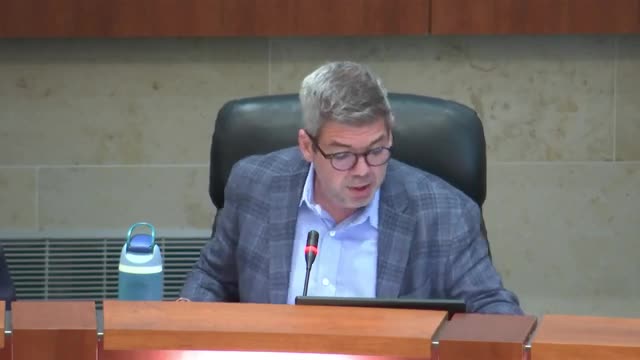CSU outlines systemwide AI strategy, launches AI Commons hub for students, faculty and staff
Get AI-powered insights, summaries, and transcripts
Subscribe
Summary
The California State University on Thursday presented a systemwide artificial intelligence strategy intended to equip students, faculty and staff across its 23 campuses with tools, training and partnerships to prepare graduates for an AI-transformed workforce.
The California State University on Thursday presented a systemwide artificial intelligence strategy intended to equip students, faculty and staff across its 23 campuses with tools, training and partnerships to prepare graduates for an AI-transformed workforce.
The presentation to the joint committees on educational policy and finance described three main initiatives: an AI workforce acceleration board that will include industry and state leaders, a CSU AI Commons Hub to provide shared AI tools and models at no personal cost to CSU community members, and a faculty-focused AI education innovations program to support adoption and curriculum changes systemwide.
The plan, presenters said, builds on recommendations from the CSU generative AI committee. "The CSU generative AI committee formed in January 2024 and met 5 times throughout the past spring semester," Deputy Vice Chancellor Nathan Evans said, noting the committee included CSSA, the Academic Senate CSU, provosts, CIOs and other campus stakeholders.
Chief Information Officer Ed Clark provided a working definition: "Generative AI refers to artificial intelligence systems that can create new content such as data, text, images, music, computer code, or even videos based on patterns learned from training data." Clark and other presenters emphasized that the strategy aims to promote equitable access to AI tools, support faculty with training and policy development, and use AI to improve administrative operations across the system.
Officials described three concrete components. The AI workforce acceleration board will bring together CSU representatives, industry partners and members of the governor's cabinet to identify needed skills and create student-facing opportunities such as AI challenges and internships. The CSU AI Commons Hub will host vendor-supplied tools and campus-developed models, custom GPTs and training resources and make them available to students, faculty and staff at no personal cost. The AI education innovations program will compile and scale faculty-developed training and curricular materials across campuses and include incentives and recognition for adoption.
State officials joined the discussion. Amy Tong, Secretary of the Government Operations Agency, summarized the state’s workgroup testing proof-of-concept AI projects in government services and described a people-centered implementation approach tied to a governor’s executive order issued in late 2023. Stuart Knox, Secretary of the California Labor and Workforce Development Agency, said workforce partners, community colleges and employers will be included to align training with labor needs.
Presenters said the CSU strategy builds on existing campus activity: many campuses have been piloting tools and creating faculty development resources, and the Commons Hub aims to knit those efforts together. Nathan Evans said much of the Commons content and campus-developed faculty resources are ready to be shared and that the system plans a phased rollout: several campuses already have tools in place, and the contract enabling broader access "has just been signed," presenters said, with campus rollouts to follow over weeks.
Trustees who spoke praised the approach and pressed for continued faculty and labor engagement, data-driven evaluation and attention to equity. Trustee Firstenberg called the presentation "the most encouraging, exciting development" and emphasized reputation and identity work for CSU. Trustee Kimbell asked about union pushback and inclusion of faculty and employees; presenters said governance and advisory structures drawn from the generative AI committee would help surface and address policy and labor questions. Several trustees urged that CSU’s diverse student body be a central resource for training and for improving the representativeness of AI systems.
Presenters described ongoing state work that informed the CSU plan: a set of five proof-of-concept scenarios being evaluated by the state (including transportation and language-access projects), additional pilots being developed, and state guidance released in December on evaluating generative AI impacts on vulnerable and marginalized communities. The academic senate and other campus stakeholders were identified as ongoing partners for policy development and evaluation.
The committees received the item as information; no formal policy or regulatory vote on the AI strategy was taken during the session. At the meeting start, the November 2024 minutes were approved by unanimous consent.
The board and state representatives said more public announcements and phased rollout details will follow in the coming days and months. Presenters said they will contract with external evaluators to develop success metrics and assess impacts on students, faculty and staff as the initiative is implemented.
